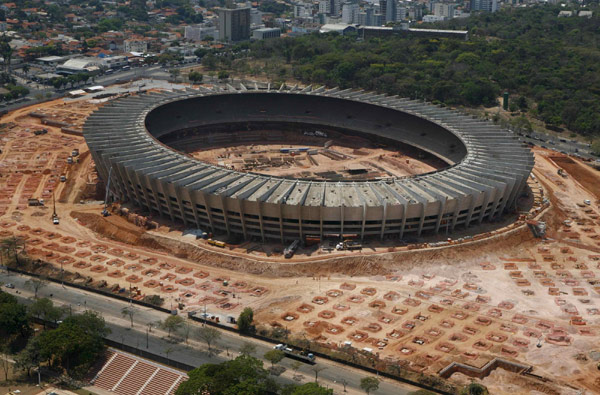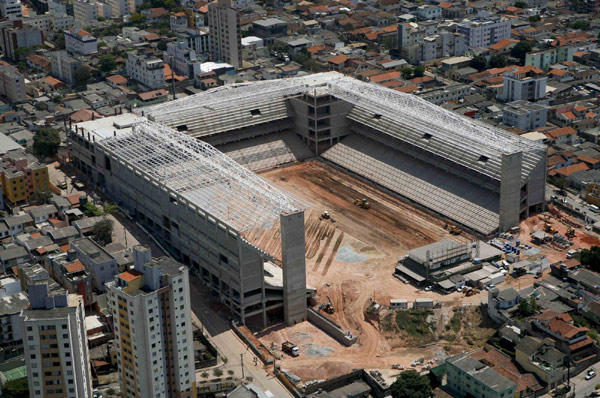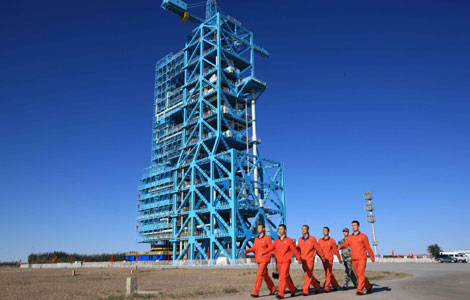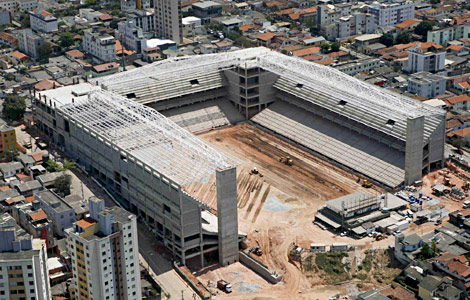Brazil's World Cup rush fuels spending blowout
Updated: 2011-09-28 10:55
(Agencies)
|
|||||||||||
 |
|
An aerial view shows the renovation work of Magalhaes Pinto soccer stadium, also known as Minerao stadium, that will be used in the World Cup Brazil 2014, in Belo Horizonte, Sept 23, 2011. [Photo/Agencies] |
* World Cup costs surging on delays, possible corruption
RIO DE JANEIRO - It is a project that should symbolize the transformational benefits of hosting the 2014 World Cup - a sleek new monorail train gliding above Brazil's steamy Amazon city of Manaus.
But Athayde Ribeiro da Costa has a different take on it.
With just under 1,000 days before the first ball is kicked, the chief public prosecutor in Amazonas state sees the monorail as part of a trend of overspending and poor planning as Brazil rushes to make up for a slow start to its preparations.
"We are very worried about overspending," he said. "We are in favor of the Cup - it can bring lots of opportunities for people and help resolve infrastructure bottlenecks, but this can't be done at the expense of misuse of public funds or corruption."
Concerns are mounting that Brazil's push to speed up its preparations for the soccer tournament risks fueling corruption and an explosion in costs dwarfing other "mega-events."
Last year's World Cup cost South Africa about $4 billion but Brazil's official estimate already stands at about $13 billion, including transport projects, stadium construction and airport expansions, making it certain to be the most expensive in history.
President Dilma Rousseff spoke in March of 33 billion reais ($18 billion) in World Cup investments and some private estimates are already way higher, putting the final bill at an eye-popping $60 billion in one case - bigger than neighboring Uruguay's annual economic output.
Legal cases are proliferating as prosecutors like Da Costa investigate suspected overspending and abuses of bidding processes. Da Costa heads a group of 12 prosecutors focusing on World Cup cases - one for each host city - and says there are more than 80 civil investigations under way throughout Brazil.
A Sao Paulo federal judge this month ordered work suspended on the expansion of Sao Paulo's Guarulhos international airport, saying that bidding rules had been ignored under the excuse of urgency. Another judge overturned that decision.
The legal cases could help save Brazilian taxpayers a lot of money but also risk causing yet more delays to a schedule that is already pushing the limits of just-in-time readiness.
"If you make it more transparent you might slow it down, and therefore increase the costs," said Christopher Gaffney, a visiting professor of urbanism at Rio's Fluminense Federal University. "If you don't make it more transparent, you're guaranteed to increase the costs because everyone's going to have their hand in the till."
Spiraling costs are a familiar ritual of World Cups and Olympic Games. In this case, though, they are sharpened by some very Brazilian problems - endemic corruption, bureaucratic and legal hurdles and high construction costs driven by a lack of capacity in its robust economy.
 |
|
An aerial view shows the renovation work of Independencia Stadium that will be used as a training center during the World Cup Brazil 2014, in Belo Horizonte, Sept 23, 2011. [Photo/Agencies] |
Some projects, including another planned monorail in Sao Paulo, are not due to be ready until just weeks before the start of the tournament in June 2014. Delays have already drawn rebukes from world soccer body FIFA and ruled out two of Brazil's 12 host-city stadiums being ready in time for the curtain-raising Confederations Cup in 2013.
Work has yet to begin on five of the 13 airports that need to be expanded for the month-long World Cup, this soccer-crazed nation's first on home soil since 1950.
The government said this month it was confident that stadiums and airports would be ready on time, but that it was concerned over slow progress on "urban mobility" projects like the Manaus monorail. Seven of the host cities have yet to start any of their planned projects.
Related Stories
Brazil reports all construction for W Cup on track 2011-09-15 16:56
Brazil sees Copa test as springboard to 2014 2011-06-22 07:56
2014 World Cup to generate 730,000 jobs in Brazil 2011-03-16 10:28
Hot Topics
Libya conflict, Gaddafi, Oil spill, Palace Museum scandal, Inflation, Japan's new PM, Trapped miners, Mooncake tax, Weekly photos, Hurricane Irene
Editor's Picks

|

|

|

|

|

|






